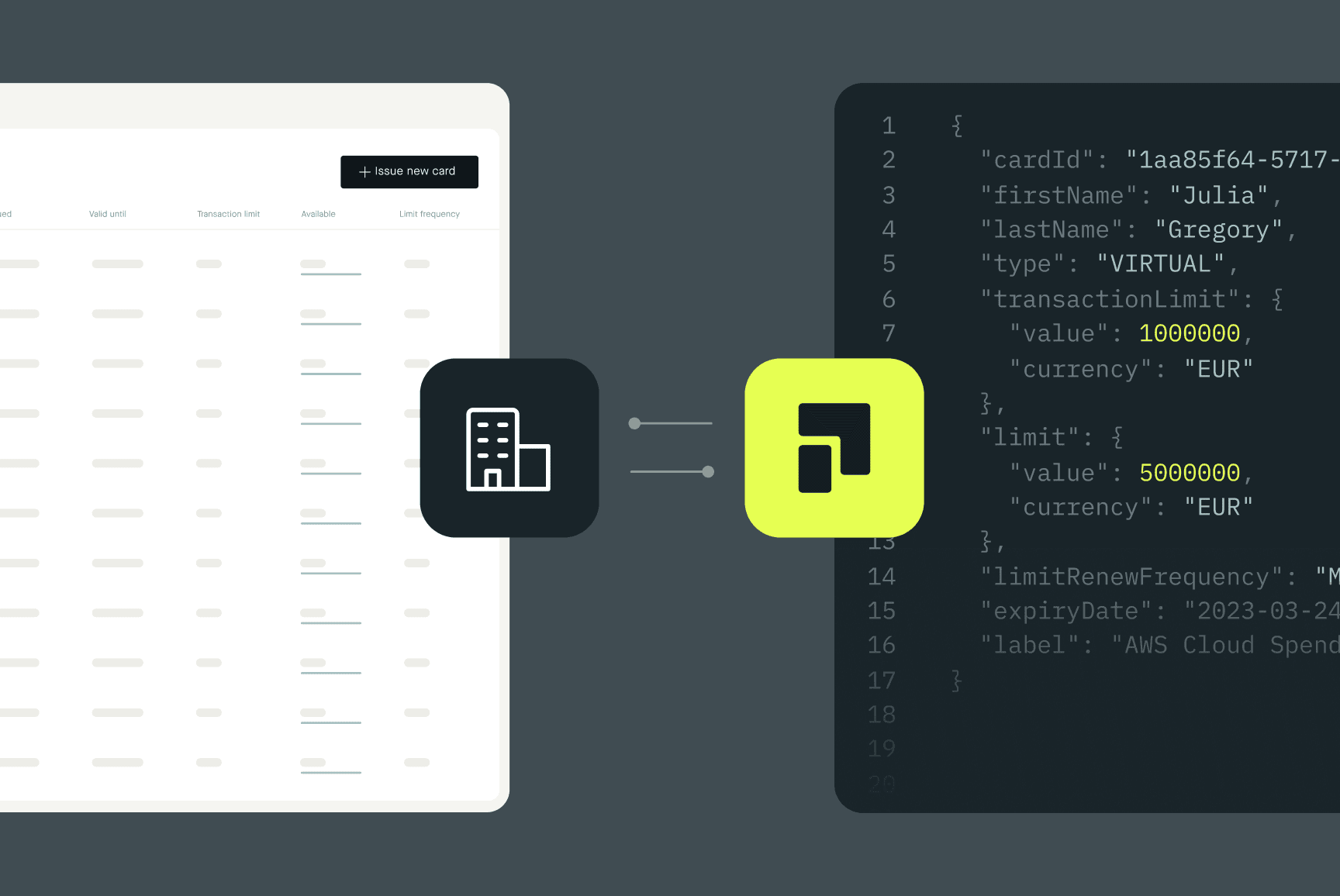Credit check for a corporate credit card: How does Schufa affect it?
When a company applies for a corporate credit card, a credit check plays an important role. Credit agencies, such as Schufa in Germany, help credit card providers assess the applicant’s creditworthiness. But how does the credit check work? And can an employee receive a corporate credit card even if they have a Schufa entry? In this article, we answer these and other important credit-related questions.


Companies issuing business credit cards naturally want to prevent payment defaults and minimize their financial risk. That’s why they pay close attention to the creditworthiness of their potential customers.
A quick overview of key factors in a credit check
The higher the risk, the more information about the applying company is considered in the credit check. However, the procedure varies from company to company.
In the credit check, the card issuer analyzes relevant macroeconomic data from the applicant’s industry, past payment behavior as well as financial figures.
In the case of corporate credit cards for employees, their personal Schufa score doesn’t matter. The creditworthiness of the management, on the other hand, may have an impact.
The Big Question in credit assessment: Will you pay your bills?
Is your company creditworthy? This is the question business partners regularly ask.
In other words: will you pay your bills?
Whether it’s a purchase on account in an online store or an application for a corporate credit card, the party carrying the credit risk wants to make sure they will get their money.
There are various procedures for checking creditworthiness. Generally, the higher the risk, the more information about a company is taken into account.
Checking creditworthiness for a corporate credit card
When you apply for a corporate credit card, the card issuer always carries out a detailed credit check to make sure your business is creditworthy.
In Germany, credit card providers use data from credit agencies such as Schufa, Crif Bürgel, or Creditreform.
In the case of small and medium-sized businesses, the credit assessment process is very similar to that of private individuals.
In contrast, larger (mostly listed) companies are given a rating by independent rating agencies such as Moody's or Standard & Poor's.
What affects a company’s credit score?
To assess the creditworthiness of a company, credit agencies use a wide range of information to derive the probability of default.
When assessing the future probability of payment, credit agencies look into macroeconomic data from the relevant industry, past payment behavior, and key financial figures.
A detailed credit report on your company may contain the following data:
company history
industry
management, including their personal credit ratings
parent company and other shareholdings, if any
current corporate loans and their maturities
for larger companies, balance sheet
in the case of small and medium-sized companies, income statement
payment history
information on debt collection
information on insolvency proceedings.
What is Schufa?
If you live in Germany, you can’t avoid hearing about Schufa. So let’s take a moment to look into what Schufa actually is (even if your personal Schufa credit rating might not have much significance when you apply for a business credit card – more about this later).
The word ‘Schufa’ is colloquially used to refer to your personal credit rating or credit report provided by the German credit agency Schufa. Every German resident has a Schufa record.
Schufa is Germany’s largest credit agency. Schufa is actually an abbreviation and it stands for ‘Schutzgemeinschaft für allgemeine Kreditsicherung.’ Which in English translates to something like ‘General Credit Protection Association.’
But in day-to-day use, Schufa usually refers to the credit score and not just the agency called Schufa.
In addition to private consumers, Schufa also has information on businesses. This is the information corporate credit card providers use when they assess a business’s creditworthiness.

How to get a Schufa report?
Just by living in Germany, you have a Schufa report. But if you want to access your own personal Schufa report, you need to do a bit of work.
There are two different types of Schufa reports:
Schufa BonitätsAuskunft. A limited report of your creditworthiness that you would usually share with third parties.
Free (GDPR) Schufa report. A full report on your personal information held by Schufa.
The ‘Schufa BonitätsAuskunft’ (also just ‘Schufa Auskunft’) is a Schufa credit score report that you can share with your potential creditors as proof of your credit score. Ordering this Schufa report will cost you, but the process itself is easily done through Schufa’s website meineschufa.de. There are also other services online and at bank branches where you can download or print out your Schufa report.
The free Schufa report, on the other hand, is a full report of the data Schufa has on you. You probably don't want to share all your personal data with strangers, but you might want to review this credit score report yourself. You can order the free Schufa report through Schufa’s website.
How important is your company's credit rating when applying for a corporate credit card?
Now, back to corporate credit cards. When you apply for a business credit card, the impact of your personal and your business’s credit rating depends on the card type.
In general, there are four types of payment cards:
revolving credit cards with a credit limit
charge credit cards with a spending limit
debit cards with direct debit
prepaid credit cards that the customer tops up.
Let’s see what role credit score plays in the application process for each of these card types.
Credit assessment for revolving credit cards and charge cards: credit scores matter
Revolving cards and charge cards both function, in essence, like credit cards. This means the money for the purchases is not directly debited from the customer’s account. And this means the card issuer carries a credit risk if the customer doesn’t pay their bill.
For both of these cards, a company’s creditworthiness plays a major role. The card issuer determines the credit or spending limit individually for each applying company.
With a poor credit rating, you will probably not get a revolving credit card or a charge card.
In the case of debit cards and prepaid credit cards, creditworthiness plays a lesser role
Depending on the credit card provider, your company’s credit rating may not be that important when you apply for a debit card.
When you pay with a business debit card, your business account is debited directly. If it doesn’t have sufficient funds, the payment is rejected.
With prepaid credit cards, the customer has to charge money to the card before they can use it. This way, there's no risk of non-payment for the card issuer. If there aren't enough funds in the credit card account, the transaction will be declined.
If you choose a debit or a prepaid card, your creditworthiness plays a lesser role – the card provider doesn’t have much of a credit risk. Sometimes, there’s no credit check at all. This varies from provider to provider.
Can you get a corporate credit card, despite the negative Schufa score of your employees?
Yes, you can. The creditworthiness of your employees is not relevant when you apply for a corporate credit card.
Even if your employee has a Schufa entry, you will be able to issue them a corporate credit.
By current EU guidelines, all transactions with corporate credit cards are settled through the linked business account. The employees' private accounts aren’t charged in any way. In the event of a payment default, the employer is always liable.
Management team’s Schufa scores may be a factor
While employees’ Schufa ratings don’t affect your company’s credit assessment, the management team’s might. Depending on the type of company, the card issuer might look into the management team’s creditworthiness.
If shareholders are liable for their private assets, this is definitely a factor in your company's credit rating.
Best practices to keep your company cards and spending safe
For your company’s own security, there are a few things you can do before handing a business credit card to an employee.
One, you should request a current Schufa report from the employee. And two, it’s smart to create an agreement for the usage of company credit cards.
And third, you can apply digital spend control and keep track of business expenses with real-time monitoring to make sure all payments are authorized and within budget.
💳 Now that you know how the credit check works, are you ready to apply for a business credit card? Book a demo with us.






